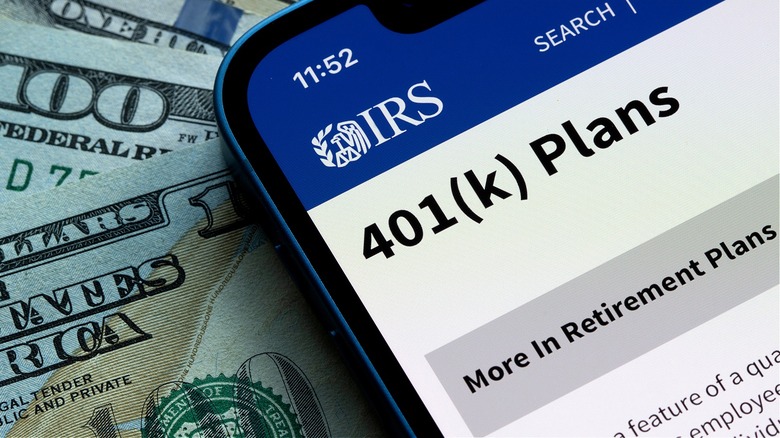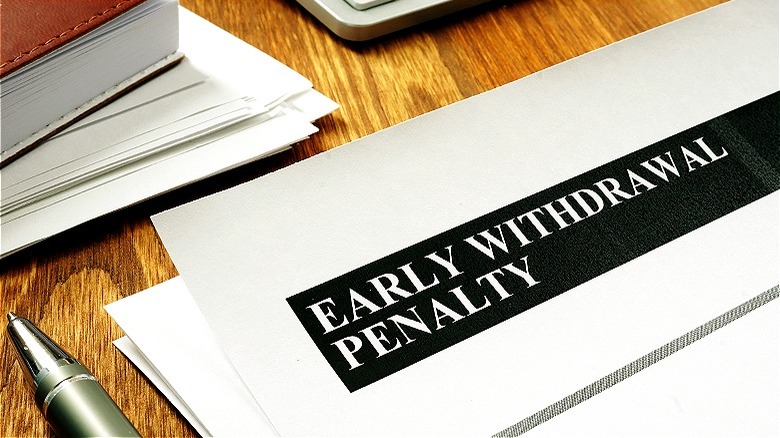Cashing Out A 401(k) Early Can Come With Major Consequences
In light of current economic factors (hello, inflation), feeling financially strapped isn't uncommon. And, depending on your specific financial situation and existing lines of credit, it might be difficult to know where to get a little extra financial help these days. This can be especially true if you only need short-term financial assistance for an emergency or surprise financial need. Given that loans can often require larger amounts than you might be looking for, and payday loans come with absurdly high interest rates, you might be looking at your retirement accounts as an easier solution to your financial predicament. While this can absolutely make it tempting to want to withdraw funds from your 401(k) early, the consequences of doing so might not be worth it.
From the withdrawal fees to income tax, the money you could end up paying to access your funds early might make you think twice about withdrawing them. Plus, the loss to your retirement account could end up hurting your retirement goals and future financial situation. With that said, there are specific circumstances that can allow you to avoid some IRS fees associated with early withdrawal. There are also options to appeal directly to the IRS or even to your workplace's plan administrator. These options all come with their own risks, however, as well as potential fees and associated taxes. Let's dive into exactly what happens when you try to withdraw your 401(k) funds early, and some possible ways to avoid those pesky penalty fees.
What happens if you cash your 401(k) out early
For starters, you must be 59 ½ years old in order to make any penalty-free withdrawals from your retirement accounts. For anyone younger, there are taxes to be considered. The IRS will assess an early distribution penalty (which is generally a 10% tax) on the amount you withdraw. It's important to realize that this IRS tax is in addition to (not instead of) the income tax you'll also be charged on the withdrawn funds.
Note that 401(k)s and IRAs have different withdrawal rules. For instance, SIMPLE IRA plans (Savings Incentive Match Plan for Employees), can incur a 25% withdrawal fee if the withdrawal is made in the first two years of participating in the program. However, you can potentially avoid the 10% fee if you roll your 401(k) into an IRA. Since there are no mandatory withholding amounts on IRA withdrawals, you could potentially pull a larger amount and pay no initial income tax.
Another thing to consider is how withdrawing funds early can create long-term effects on your overall retirement plan. Choosing to withdraw during market downturns can serve to lock in your losses and make it more difficult to participate in any potential economic rebound that might occur. Also important? Don't take out more than you need. As Adam Harding, a certified financial planner, told NerdWallet, "If you need $10,000, don't make it $15,000 just in case. You can't get it back in once it's out."
Some scenarios for penalty-free withdrawals
There are a few specific circumstances in which you can cash out your 401(k) early and not face negative consequences. The Internal Revenue Service will waive its early distribution tax penalty for specific (albeit widely varied) scenarios. Reasons can include dividing up a 401(k) during divorce proceedings, being terminally ill, giving birth or adopting a child, being the victim of a natural disaster, or even being a military reservist who's called to active duty.
You can also qualify for a hardship withdrawal, which allows you to withdraw a specific amount from your 401(k) tied to the limits of your financial need. In order to qualify, you must be able to document an immediate and serious financial need (like medical bills, tuition, funeral costs, etc.). However, it's important to realize your employer's specific account plan administrator is ultimately the decider for this type of withdrawal. Depending on the administrator, additional information could be required to prove your financial need, and you could still end up paying income taxes on the hardship distribution and/or the 10% IRS tax.
Another consideration is the new Secure 2.0 Act, a federal measure passed in late 2022 and set to begin in 2024, which will allow for special emergency distributions from retirement plans. Under the act, you may withdraw $1,000 a year from your 401(k) completely penalty-free as long as you repay it over three years. While you cannot take out any other distributions until your initial amount is repaid, it can still serve as a much-needed emergency fund for those who might be financially struggling.


